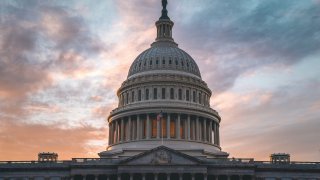With Donald Trump In Office, Congress Must Safeguard Its Constitutional Powers
As the president-elect threatens impoundment and recess appointments, Congress must step up to protect its central constitutional role.
Throughout American history, political parties have evolved and continue to do so. The Democratic Party, though much older than the Grand Old Party (GOP), was originally the party of small government and lower taxes, going through a populist phase before settling on its familiar role as the progressive big government party.
The GOP, or Republican Party, was the original progressive party of Lincoln, touting the prohibition of slavery in the Western territories and the big government “American system” of central banking, federal infrastructure improvements, land grants, and high tariffs. The progressive wing of the party lost out to the big-business wing in the late 1800s but resurrected itself during the Theodore Roosevelt and William Howard Taft administrations.
Only in the 1920s, during the Warren Harding and Calvin Coolidge administrations, was the GOP the party of small government. During and after the Democratic New Deal (under Franklin Roosevelt) and Fair Deal (under Harry Truman), the Republican mainstream accepted most of the new government expansion despite the continued rhetoric harping on the benefits of smaller government. For example, although Ronald Reagan said “government was the problem,” federal spending increased substantially under his watch.
Reagan realized that the party could win votes by reducing taxes but not cutting popular government programs. After George H.W. Bush, the last Republican president to care about resulting budget deficits and debt, and Bill Clinton—both of whom made efforts of fiscal responsibility that eventually created a government surplus—George W. Bush and Donald Trump returned to the election-winning formula of lower taxes and increased spending. This mindset was best summarized by Bush’s Vice President Dick Cheney as “Reagan proved deficits don’t matter.” Democrats Barack Obama and Joe Biden did a lousy job, compared to Clinton, in cleaning up these later Republican deficits.
Now, President-elect Donald Trump at least rhetorically wants to resurrect Richard Nixon’s claim that the chief executive can impound selected funds that Congress has legally appropriated to spend and the president has already signed into law. Trump implies this is to prevent Congress from spending too much money. Still, given his own record of profligate spending during his first term (he added $7.4 trillion to the national debt), he likely wants to spend the impounded money elsewhere. For example, during his first term, he transferred money from the Department of Defense to begin building his border wall.
At any rate, because the Constitution gives Congress the primary power of the purse as one of its central functions in the U.S. system of checks and balances, unilateral presidential impoundment of legally appropriated funds is unconstitutional and illegal under the Congressional Budget and Impoundment Control Act of 1974. Congress should not relinquish this vital constitutional role.
Back when the Democrats held the White House for two decades, from 1933 to 1953, the Republican Party fought to honor the constitutional framer’s vision of a presidency with limited powers. However, as Republican prospects for winning the presidency again improved, they began to join the Democrats in expanding the chief executive’s role. Richard Nixon, Ronald Reagan, George H. W. Bush, George W. Bush, and Donald Trump freely augmented executive power as they saw fit.
Recently, presidents such as Bush the Younger and Trump have even made one of their primary goals in office to expand executive power through the questionable unitary executive theory. This theory claims that the president has unilateral and absolute control over the executive branch. The Constitution’s framers would roll over in their graves to see their congressionally dominated system of checks and balances overtaken by such an imperial presidency and an imperious judiciary, both of which were supposed to restrain a powerful Congress, not run the show themselves.
President-elect Trump also would like Congress to abdicate its critical power of approving the chief executive’s appointment for cabinet and other high-level federal jobs. He wants Congress to take the unprecedented step of recessing for the minimum time required for him to appoint temporary officials as “recess appointments” without any congressional approval. In the early centuries of the republic, Congress only met a few months of the year because of the requirements of the agricultural economy and severe constraints of transportation and communication to and from the nation’s capital. Temporary recess appointments in the Constitution were meant to be rare until Congress could convene again.
Nowadays, Congress is in session more or less continuously. The framers would frown on what they intended as the premier branch of government purposefully going out of session or rolling over so a new imperial presidency could usurp their remaining principal powers. Thus, the Republicans controlling the Senate and House have one last chance to push back against executive overreach, the outcome the framers feared the most and that their system of checks and balances was designed to prevent.
Ivan R. Eland is a Senior Fellow at the Independent Institute and Director of the Independent Institute’s Center on Peace & Liberty. Dr. Eland graduated from Iowa State University with an M.B.A. in applied economics and a Ph.D. in Public Policy from George Washington University.
Image: Caleb James Fisher / Shutterstock.com.

